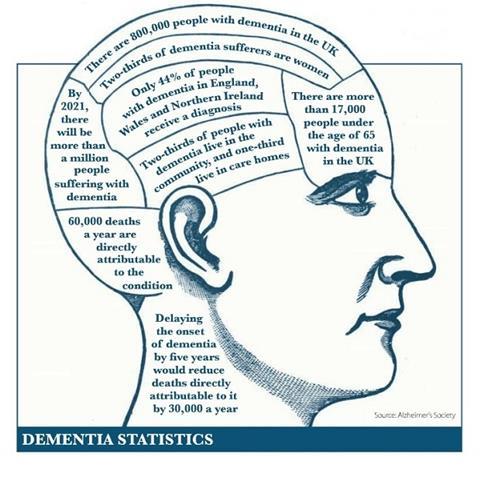
If you read nothing else, read this…
- Diagnosis rates of people with dementia are increasing.
- Employers have a duty of care and a legal requirement to make workplace adjustments for staff with dementia.
- Employee assistance programmes, private medical insurance and group income protection can help to support affected staff.
The mental illness hit the headlines in February when health secretary Jeremy Hunt pledged faster diagnosis times for people with suspected dementia.
In February 2014, the government also announced the appointment of a World Dementia Envoy, Doctor Dennis Gillings, to help speed up research into the condition. He will head up a World Dementia Council.
According to the Alzheimer’s Society, there are 800,000 people with dementia in the UK, 17,000 of which are under the age of 65, classed as having ‘young onset’ or ‘working-age’ dementia.
The removal of the default retirement age in 2011, combined with people living longer, means that workforces are ageing and dementia is likely to become a more pressing issue for employers.
Beate O’Neil, head of wellness consulting at Punter Southall Health and Protection Consulting, says: “I think it’s a rising issue, which will become even more prevalent as we go forward because of the removal of the default retirement age, and because of employees feeling they have to work longer.”
The government’s move to increase awareness and better diagnosis of the condition is likely to result in a rise in reported cases of affected employees as the issue becomes less taboo. This is creating an increasing need for employers to fully understand what they can do to support staff.
“As awareness rises, this will cause an increasing issue for employers and they will have to address it, especially with an ageing workforce,” says O’Neil.
Right diagnosis
Employers should start by helping employees to get the right diagnosis and separating dementia from other problems that might present similar symptoms.
Joy Reymond, head of rehabilitation services at Unum, says: “Sometimes it is mistaken for stress, anxiety or depression, and it is not until quite late that it is recognised that it is not those things and that it is actual dementia at play.”
Dementia can present a range of symptoms, which are specific to individual sufferers.
Karishma Chandaria, dementia friendly communities programme manager at the Alzheimer’s Society, says: “There are general symptoms related to dementia, such as changes to behaviour and mood and physical mobility issues, which impact on memory.”
Awareness of the condition among employees, as well as employers, can be extremely useful because it can prevent sufferers feeling isolated.
Libby Payne, clinical director at CIC Employee Assistance, says: “Information is always of value. It might be that if an employee does have early onset dementia, they might never contact the employee assistance programme (EAP), but their colleagues or their manager might. The manager might want support because they are concerned about an employee. That is where knowledge of early onset dementia can be really useful.”
Employer support
Open dialogue is central to employers supporting a staff member with dementia, so sufferers know where to go if they are having problems with their illness, especially in relation to their roles and responsibilities.
Chandaria says: “Having the space to communicate, knowing there is occupational health available or if there is an EAP, or the first port of call being their manager: it’s about that openness to talk about any difficulties they are experiencing.
“There is still a lot of fear and stigma around dementia, and if there is still fear about telling friends and family, there is going to be even more fear about telling an employer.”
Healthcare benefits
Employers are legally bound to provide workplace adjustments and adaptations, because dementia is a protected disability under the Equality Act 2010. An employer’s healthcare benefits can play a key role in supporting affected staff.
Creating a ‘buddy’ system for affected employees is one way employers can provide support.
Punter Southall’s O’Neil says: “This is someone who understands [the sufferer’s] work role and knows what they can do, so they can keep an eye on them, but also provide support, especially in the period when the employee feels frustrated at how the condition is impacting them.”
Technology, such as electronic calendars with automatic reminders for appointments, and dictaphones for phone conversations and meetings, can also help.
“An EAP will definitely help provide support and advice, both for the employee and the employer,” says O’Neil. ”For the employee, it will tell them where they can join support groups, what their legal rights are and how they can get support.”
EAPs can also provide counselling.
Unum’s Reymond advises employers to consider a wellness recovery action plan, known as a ‘wrap’, which can benefit both employers and staff. “It’s a plan that the employee and employer develop together in which the employee says, ‘when I show these symptoms, this is what I would like you as the employer to do, or these are the things that would help me’,” she says.
A wrap is often used to tackle mental health problems because of the positive way it invites employers to sit down and talk to staff about their issues.
Employees may also be able to use a private medical insurance policy to secure their first diagnosis, and to access any counselling treatments they may need. In addition, employees on long-term sick leave could become income protection claimants.
Mark Hall, chief medical officer at Capita Health and Wellbeing, says: “If an employee gets early-onset dementia, they will be limited in how they can carry on working. There are a few conditions that trigger ill-health retirement at an early age, and early-onset dementia is one of them.”
Many individuals suffering with dementia can lose touch with friends and family after being diagnosed, so employer support is essential. All staff with health and wellbeing responsibility within an organisation must therefore be aware of the condition and the symptoms to recognise in their workforce, and must receive training around mental health issues to be able to do this.

Viewpoint: Enabling young people with dementia to continue working
‘Young onset’ dementia affects people of working age, usually between 30 and 65 years old. This is also referred to as ‘early onset’ or ‘working-age’ dementia. Young onset dementia is thought to affect more than 64,000 people in the UK, many of them in the midst of their careers when they start experiencing symptoms.
The most common cognitive impairments in people with dementia are short-term memory loss, the inability to take in new information, and attention loss/distractibility. The signs can be subtle at first. A person might start to show a lack of competence when performing their regular duties, miss deadlines or make uncharacteristic mistakes, struggle with communicating, writing or dealing with figures, behave inappropriately or have problems using equipment or technology.
Legal obligations
The Equality Act 2010 states that an employer cannot make an employee redundant because of a disability, including dementia. An employee may want to continue working, or have to work out of financial need.
This means an employer must make accommodations to help them continue in the workplace. These could include allowing extra time to meet deadlines, presenting information visually and verbally, and demonstrating tasks multiple times if necessary.
Employers could also reduce an employee’s level of responsibility; move them to a different role, allow more flexible hours or more frequent breaks; find them a less distracting office or work area; provide aids and equipment, such as voice recorders and check lists; and provide examples of completed work for reference.
Sharing a dementia diagnosis with others is difficult, so when an employee is ready to tell their colleagues, it is important that staff are well informed and willing to help and support them. This will create the right environment for the employee with dementia to work as well as they can.
Finally, an employee may need additional support with emotional issues. It is common to feel down or anxious when going through these changes, adjusting to new roles at work, and coping with stress. And, when the time comes, the employee will need help and advice in leaving employment.
Tessa Gutteridge is director of YoungDementia UK





































